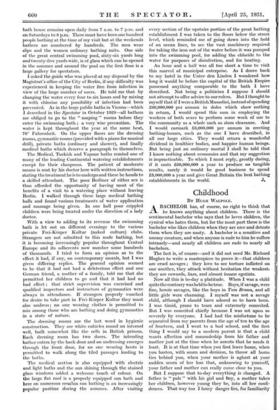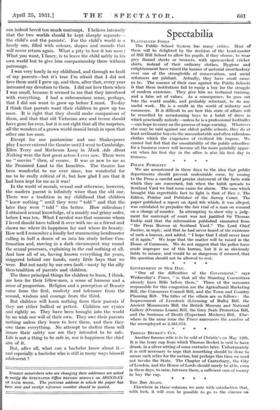Childhood
BY HUGH WALPOLE.
ABACHELOR has, of course, no right to think that he knows anything about children. There is the sentimental bachelor who says that he loves children, the cynical who hates them, but for the most part there is the bachelor who likes children when they are nice and detests them when they are nasty. A bachelor is a sensitive and uneasy creature, and when anyone is rude to him he suffers intensely—and nearly all children are rude to nearly all bachelors.
The fact is, of course—and it did not need Mr. Richard Hughes to write a masterpiece to prove it—that children are cruel savages ; they love to see torture inflicted on one another, they attack without hesitation the weakest, they are cowards, liars, and almost insane egotists.
Now all this is to-day a platitude. When I was a child quite the contrary was held to be true. Boys, if savage, were fine, heroic savages, like the boys in Tom Brown, and all little girls were charming. I myself was not a savage child, although I should have adored so to have been. I was timid, prone to tears and extremely conceited. But I was conceited chiefly because I was set upon so severely by everyone. I had had the misfortune to be separated from my parents from the age of ten to the age of fourteen, and I went to a bad school, and the first thing I would say to a modern parent is that a child wants affection and comradeship from his father and mother just at the time when he asserts that he needs it least. It is at that time when you first leave home, when you hasten, with scorn and derision, to throw all home ties behind you, when your mother is aghast at your sudden scorn of her loss that, unknowing to yourself, your father and mother can really come close to you.
But I suppose that to-day everything is changed. A father is " pals " with his girl and Boy, a mother takei her children, however young they be, into all her confi- dences. That way too I fancy danger lies, for familiarity can indeed breed too much' contempt. I believe intensely that the two worlds should be kept sharply separate— the child's and the parents'. For the child's world is a lovely one, filled with colours, shapes and sounds that will never return again. What a pity to lose it too soon I What you want, I fancy, is to leave the child safely in his own world but to give him companionship there without patronage.
I was very lonely in my childhood, and through no fault of my parents—but it's true I'm afraid that I did not love them until I grew up, and then, after that, every year increased my devotion to them. I did not love them when I was small, because it seemed to me that they interfered with everything. I had a subconscious sense, perhaps, that I did not want to grow up before I must. To-day I think that parents want their children to grow up too soon. It is right that they should make companions of them, and that that old Victorian awe and terror should have gone for ever, but it is not right that all the surprises, all the wonders of a grown world should break in upon that other one too soon.
Except for one pantomime and one Shakespeare play I never entered the theatre until I went to Cambridge.
Ellen Terry and Matheson Lang in Much Ado About Nothing were the first great actors I ever saw. There were no " movies " then, of course. It was as new to me as the Promised Land to the Israelites. The theatre has been wonderful to me ever since, too wonderful for me to be really critical of it, but how glad I am that it had been kept for me as it was !
In the world of morals, sexual and otherwise, however, the modern parent 'is infinitely wiser than the old one.
There was a tradition in my childhood that children " knew nothing " until they were " told " and that the later they were " told " the better. How ridiculous !
I obtained sexual knowledge, of a muddy and grimy order, before I was ten. What I needed was that someone whom I loved should have talked it over with me as a friend and shown me where its happiness lay and where its beauty. How well I remember a kindly but stammering headmaster calling in half a dozen of us into his study before Con- firmation and, moving in a dark circumspect way round the sexual processes, explaining in the end nothing at all. And how all of us, having known everything for years, sniggered behind our hands, nasty little boys that we were. But not nasty by our own fault—nasty by the silly then-tradition of parents and children.
The three principal things for children to learn, I think, are love for their fellow-men, a sense of humour and a sense of proportion. Religion and a perception of Beauty come from the first, modesty and tolerance from the second, wisdom and courage from the third.
But children will learn nothing from their parents if they are either bullied or petted. Children are cynics and rightly so. They have been brought into the world by no wish nor will of their own. They owe their parents nothing unless they learn to love them, and then they owe them everything. No attempt to shelter them will insure their safety nor are they intended to be safe. Life is not a thing to be safe in, nor is happiness the chief aim of it.
But, after all, what can a bachelor know about it— and especially a bachelor who is still in many ways himself adolescent ?







































 Previous page
Previous page